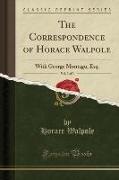Mehr lesen
Excerpt from The Correspondence of Horace Walpole, Vol. 3 of 3: With George Montagu, Esq.
An account is come of the Bostonians having voted an army of sixteen thousand men, who are to be called minute-men, as they are to be ready at a minute's warning. Two directors or com missioners, I don't know what they are called, are appointed. There has been too a kind of mutiny in the 5th regiment. A soldier was found drunk on his post. Gage, in this time of danger, thought rigour necessary, and sent the fellow to a court-martial. They ordered 200 lashes. The general ordered them to improve their sentence. Next day it was published in the Boston Gazette. He called them before him, and required them on oath to abjure the communication: three officers refused. Poor G. Is to be scape-goat, not for this, but for what was a reason against employing him, incapacity. I wonder at the precedent! Howe is talked of for his successor. - Well, I have done with you! Now I shall go gossip with lady Ailesbury.
About the Publisher
Forgotten Books publishes hundreds of thousands of rare and classic books. Find more at www.forgottenbooks.com
This book is a reproduction of an important historical work. Forgotten Books uses state-of-the-art technology to digitally reconstruct the work, preserving the original format whilst repairing imperfections present in the aged copy. In rare cases, an imperfection in the original, such as a blemish or missing page, may be replicated in our edition. We do, however, repair the vast majority of imperfections successfully; any imperfections that remain are intentionally left to preserve the state of such historical works.
Über den Autor / die Autorin
Horatio Walpole, 4th Earl of Orford (1717 - 1797) - also known as Horace Walpole - was an English art historian, man of letters, antiquarian and Whig politician. He had Strawberry Hill House built in Twickenham, south-west London, reviving the Gothic style some decades before his Victorian successors. His literary reputation rests on his Gothic novel, The Castle of Otranto (1764) and his Letters, which are of significant social and political interest.

